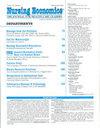2016年总统大选:现实vs神话
IF 1
4区 医学
Q3 NURSING
Nursing Economics
Pub Date : 2016-05-01
引用次数: 0
摘要
民主国家的政治需要通过辩论来治理。护士是投票公众的重要组成部分,我们需要评估我们自己的愤怒、期望和价值观。认清选举季中的四大误区可以改善政治对话。这种对话必须承认不同的群体、利益和观点,然后寻求平衡或调和这些利益的方法。用这种思维模式来定义我们的政治,而不是屈服于分裂的言论,我们可以朝着建立一个更好的政治体系迈出重要的一步。本文章由计算机程序翻译,如有差异,请以英文原文为准。
The 2016 Presidential Election: Reality vs. Myths.
Politics in a democracy requires governance through debate. Nurses are an important part of the voting public and we need to assess our own anger, expectations, and values for this election. Recognizing four myths during this election season can improve the political conversation. This conversation must acknowledge different groups, interests, and opinions and then seek ways to balance or reconcile those interests. Using this as a mental model to define our politics rather than succumbing to divisive rhetoric, we can take a major step toward building a better political system.
求助全文
通过发布文献求助,成功后即可免费获取论文全文。
去求助
来源期刊

Nursing Economics
医学-护理
自引率
16.70%
发文量
0
期刊介绍:
Nursing Economic$ advances nursing leadership in health care, with a focus on tomorrow, by providing information and thoughtful analyses of current and emerging best practices in health care management, economics, and policymaking. The journal supports nurse leaders and others who are responsible for directing nursing''s impact on health care cost and quality outcomes. The journal is published six times per year.
 求助内容:
求助内容: 应助结果提醒方式:
应助结果提醒方式:


